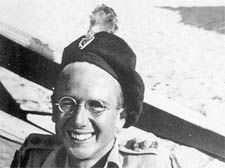|
|
 |
| |

Nicholas Mosley on leave in Egypt, August 1944. |
Mosley confronts his demons, old and new
Nicholas Mosley, son of fascist leader Sir Oswald, recalls his wartime experiences, writes Gerald Isaaman
TIME AT WAR
by Nicholas Mosley,
Weidenfeld and Nicolson, £14.99.
HE never traded on his past. Why should he? His father was Oswald Mosley, the hated leader of the British Union of Fascists. And when I first met him at his grand house in Church Row, Hampstead, the subject remained sensitive and taboo.
Who could blame him? Yet Nicholas Mosley is such a remarkable survivor of the seed some regard as evil that he went on to become reconciled with his father and published two volumes of enlightened family biography in which he traces the torment of that tangled relationship.
Yet it is only now, aged 83, that Nicholas, the hesitant, stuttering son who became a brilliant novelist, writes poignantly about his past inheritance and confronts his own hopeless monsters, old and new.
In this fragile yet compelling addition to his personal history he balances the past with his own exploits in the Rifle Brigade in Italy during World War II, in particular winning the Military Cross in a battle at Monte Spaduro where, his sub-machine gun magazine empty, a German shot directly at his heart – and missed, such is the bizarreness of fate.
“I was frightened, yes, but what I was most frightened of was not being able to stand the fear – and then what would happen?” he asks himself. “The fabric of the mind would crack and I would fall through?”
He didn’t. And when the blood and thunder was over he and his small platoon were elated, Mosley wrote home: “I have yet to meet a man who fought well because he believes in the cause for which he is fighting… it is always pride that incites and succeeds in war.”
All of which is a pointer also to his feelings about what is possibly the most grim conflicts ever that now encompass us. “War is both senseless and necessary, squalid and fulfilling, terrifying and sometimes jolly,” says Mosley, now resident in Camden Town. “This is like life. Humans are at home in war, though they seldom admit this. They feel they know what they have to do.”
And he adds significantly: “It is in peace that humans for the most part feel lost – they have to find out what it is they have to do. For reassurance they find themselves dragged back to conflict and to stories of conflict. But this should be shown as necessary by a true story of war.”
But in this clash of personal relationships on a heightened scale, Mosley, then an Eton schoolboy, is being told by his housemaster of his father’s arrest, along with his mother, in 1940, allegedly as security risks, though more likely because they were seen as traitors. Eton, amazingly, didn’t allow such problems to upset any applecarts.
“I thought that my father was a politician less than lunatic than most,” is Mosley’s belief, but sinister suspicions worry him when his father offers him a safe conduct “password” to give to Hitler’s Nazi generals should he be captured.
This is the remarkable story of a young man from a remarkable background growing up in remarkable times, his own insatiable honesty, and the need for belief and love from his disastrous parents, confronting an abyss under enemy fire of all kinds
After military triumph he stayed on good terms with Sir Oswald – “so long as he remained a gentleman farmer.” But while Nicholas lost himself in north Wales with his first wife, determined to become a writer, the Fascist tendencies returned like a latent disease,and his father stood for Parliament in North Kensington.
Worse still, he attempted to seek power by attracting the anti-black vote, in place of Mosley’s blatant anti-Semites, who were beaten by valiant Jewish resistance at the Battle of Cable Street, in London’s East End, coincidentally 70 years ago last month.
By now Nicholas had become a convinced Christian. “I became determined to have a decisively antagonistic confrontation with him,” he records.
“I managed this; and in the course of it he said he would never speak to me again. The situation lasted for several years.”
Those dark clouds of destruction more than half a century ago have gone. Now new more horrendous ones emerge, as with nuclear annhilation in the Cold War.
And Nicholas confronts them in a different, positive if enigmatic way. “Peace can be found in the mind and in the heart,” he concludes his melancholic but forever hopeful memoir.
“War, evolution, can go on elsewhere.”
Bang on. When you are 83 you can, at last, live for the moment.
|
 |
 |
|
 |
|


